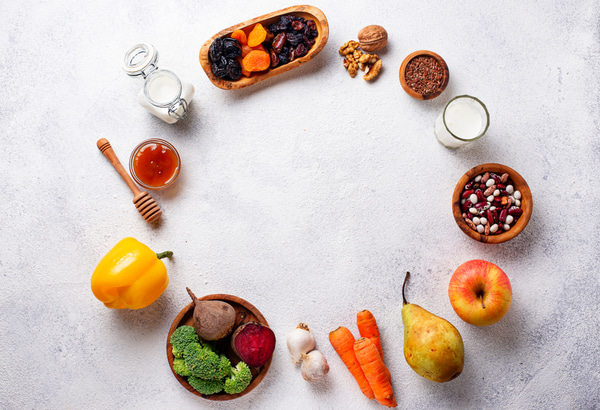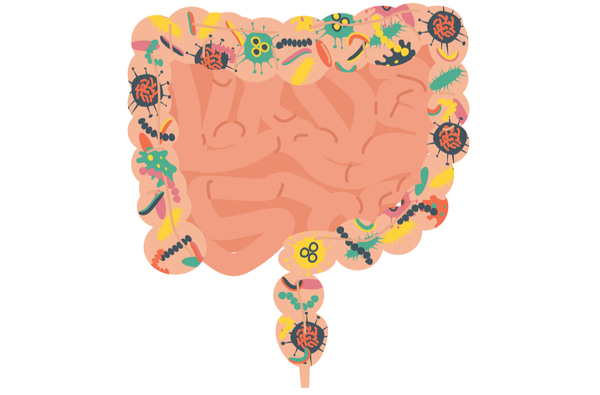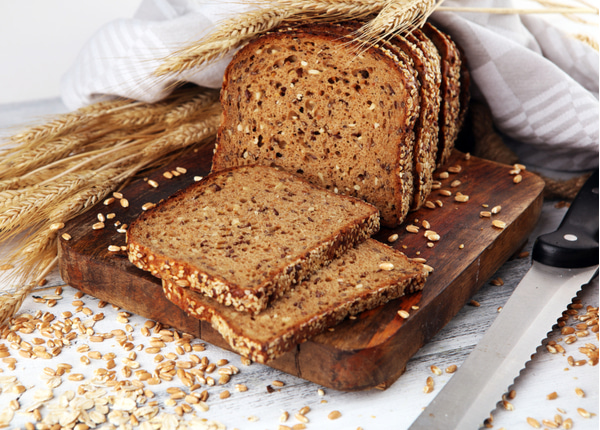HEALTHY GUT

Food is one of life’s greatest pleasures. But more than that, it fuels our bodies with the nutrients, vitamins and essential goodness we need to function.
The true hero in the process of churning the food we eat is the gut – an incredibly fascinating, complex and integral organ. In fact, your gut is closely linked to many other aspects of your health.
We have come across numerous studies that have demonstrated that your gut health impacts your mood and mental health. Your gut health is also linked to autoimmune diseases, skin conditions… and even cancer.
With such a complex link to your entire body, a healthy gut is key to enjoying a healthy and happy life from the inside out.
Navigating your gut health can feel like a never-ending maze. There are millions of resources, websites and news stories that each share different ‘facts’ and perspectives. So, where do you start?
Gut Dr is here to help you make a meaningful difference in your gut health. With decades of research and experience treating hundreds of patients, we provide you with easy to understand and accurate information to help keep your tummy healthier and happier.

How does gut health affect your overall health?
You may be thinking, “Isn’t the gut just an organ that turns my food into poo?” But it is so much more than just a food processor. Your gut has a lot to answer for!
Inside your gut lives what’s called ‘gut microbiome’. As scientific as it sounds, a gut microbiome refers to the microorganisms living in your intestines.
Think of your intestines as its own microbial ecosystem. In this ecosystem, your body can have between 300 and 500 different species of gut bacteria.
That’s a lot of gut species living inside your gut!
And although some microorganisms can be harmful, many are incredibly beneficial and necessary for your health. Having a wide variety of bacteria can enhance your immune system, improve your mental health and provide numerous other benefits.
Looking after your gut microbiomes can make all the difference.
What are common gut issues?
Gut problems are far more common than you may realise. There is certainly no need to suffer in silence.
At Gut Dr, you will find general information to help you understand your symptoms, what could be causing them and how to improve your gut troubles. Some of the most common gut issues are:
Bloating
Your pants fit when you put them on in the morning. But come later in the day, they feel uncomfortably tight. Or maybe you feel like you’re six months pregnant but you didn’t overeat. Sound familiar?
Vomiting
As unpleasant as it is, we have all experienced vomiting at some point in our lives. Thankfully, you are not alone in experiencing the unpleasant sensation of vomiting. Gut Dr provides accurate and easy to understand information about vomiting, what causes it and how you can treat vomiting.
Allergies
Whether you are an allergy sufferer or you want to learn more about what you can do to reduce the likelihood of developing one, you are not alone. Gut Dr is here to help you understand the dynamics of allergies, how to treat symptoms and enjoy a healthier and happier gut.
Probiotics and Prebiotics
Probiotics, prebiotics, symbiotics… there is a wealth of information about the world of ‘biotics’! But what exactly are they and what is their role in promoting good gut health? With so much information and claims of good sources of probiotics and prebiotics, it can be overwhelming understanding how to take them and whether it applies to you or not.
Infant and Baby
Every stage of your baby’s journey with food is an opportunity to lay the foundation of good gut health. From their first solids as you introduce a diverse diet packed with dietary fibre, you will ensure that their tummy stays happy and healthy for longer.
Regardless of what type of gut problem you’re experiencing, we have the information to help you enjoy a happier and healthier gut from the inside out.

What are some ways to improve my gut health?
Looking after your gut – and millions of different gut microbiota that call it home – is absolutely essential. From the foods you eat, to your lifestyle, you can enjoy a journey to a healthier and happier gut.
While there are many different ways to improve your tummy’s happiness and function, these are some of the most common and important strategies you can implement:
Lower your stress levels
High stress levels take a toll on your whole body… including your gut.
It’s important to find activities or hobbies that can help reduce your stress levels. Some popular ways to lower stress include meditation, exercise, spending time with friends or family, yoga or playing sports.
Get enough sleep
In our increasingly busy world, poor sleep quality is a common problem. But not getting enough sleep can have serious impacts on your health – and your gut.
Try to prioritise getting at least seven to eight hours of uninterrupted sleep per night. Your tummy will thank you for it!
Stay hydrated
Drinking plenty of water has been shown to have a beneficial effect on the mucosal lining of your intestines, as well as on the balance of good bacteria in your gut. Staying hydrated is a simple way to promote a healthy gut.
Check for food intolerances
If you have symptoms such as cramping, bloating, abdominal pain, diarrhoea, rashes, nausea, fatigue or acid reflux, you may be suffering from food intolerance.
Try eliminating foods to see if your symptoms improve. If you identify a food or group of foods that are contributing to your symptoms, you may feel a positive change in your gut health if you remove them from your diet. You can keep a food diary to help you track any symptoms and monitor the foods you eat.
Change your diet
You’ve heard the saying, “You are what you eat.” And if you’re eating a lot of processed, high-sugar and high-fat foods, then expect to feel some unhealthy effects on your gut.
Eating plenty of plant-based foods and lean protein can positively improve your gut health. A high-fibre diet can also tremendously contribute to a healthier gut microbiome.
Foods that are rich in fibre include legumes, beans, peas, oats, bananas, berries, asparagus and leeks.
Whole grains are also an excellent source of dietary fibre and promote the growth of certain beneficial bacteria in your gut.
An important reminder
It’s important to remember that every person’s gut is uniquely different. There are many factors that can influence your gut health, and not all strategies will work for you.
Always remember to consult with your doctor or dietitian before making any drastic changes to your diet or if you’re planning to take any new medications or supplements.

The role of dietary fibre for your gut health
It’s easy to get caught up in counting calories and reading the serving sizes of added sugars, fats, proteins and carbohydrates when you’re trying to eat well.
But there’s one lonely nutrient that often gets thrown to the wayside: dietary fibre.
Dietary fibre is perhaps the most commonly ignored nutrient, yet it plays a tremendous role in your overall gut health and function.
Studies have found that fibre is intimately tied with the importance of your gut microbes. And your tummy loves fibre!
A diet that is high in proper fibre makes your gut bacteria thrive… and ultimately keeps your tummy healthier and happier for longer.
Fibre intake
According to the Nutrient Reference Values for Australia and New Zealand, the recommended intake of dietary fibre is 30 grams per day for adult males and 25 grams per day for adult females.
If you’re a parent, there are slightly different factors to consider for your baby’s fibre intake.
According to the Nutrient Reference Values for Australia and New Zealand, there are no daily fibre intake recommendations for the first year of your child’s life, due to a lack of data on infants and fibre intake.
However, based on the current Australian guidelines, Gut Dr’s table shows how much dietary fibre your child should consume according to their age.
Daily fibre intake for kids
| Age | Boys | Girls |
| 6 – 12 months | Up to 10 grams of fibre/day | Up to 10 grams of fibre/day |
| 1 – 8 years | AGE + 10 grams of fibre/day | AGE + 10 grams of fibre/day |
| 9 years onwards | Double the AGE = grams of fibre per day until the age of 15. Stay on this until age 18. | Double the AGE = grams of fibre per day until the age of 13. Stay on this until age 18. |
You will find more detailed information about the recommended fibre intake for babies, in our Infant and Baby section.
However, like all things in life, dietary fibre should be consumed in moderation. Eating too much fibre can cause digestive problems, including gas build up and intestinal blockages.

How can I add more dietary fibre in my diet?
We all know symptoms like constipation can be unpleasant and annoying to deal with. Thankfully, adding more dietary fibre in your diet can help relieve these uncomfortable symptoms and also provide your gut with essential nutrients.
Here are some ways to build a diverse gut biome with a fibre-friendly diet:
- Eat more fruits and vegetables. Fibre is naturally found in all fruits and vegetables.
- Don’t forget beans, peas and lentils. Legumes are a delicious source of fibre.
- Add fibre to your breakfast. Integrate fibre into the first meal of your day by eating oatmeal or a whole grain cereal. You can also enjoy yoghurt with fruit and nuts.
- Explore the world of whole grains. Other great high-fibre choices are quinoa or whole-wheat couscous.
Are you ready to dive deeper into your gut?
At Gut Dr, we believe an unhealthy gut shouldn’t be a barrier to a happy and healthy life. We want to help you get to the bottom of your gut health issues, as well as help you learn more about the fascinating organ that is your gut.
Leading gastroenterologist Dr Vincent Ho takes a deep dive into the exploding medical field of gut health and highlights small steps that go a long way in fortifying your tummy health. With decades of experience and research, Gut Dr can help you enjoy a happier and healthier gut.
For more information on gut health, subscribe to our newsletter. Or check out Dr Vincent Ho’s latest book ‘The Healthy Baby Gut Guide‘ for practical and easy-to-follow advice for parents on looking after your baby’s gut health.
Have a suggestion?
Get in touch to submit a question for a feature article.




